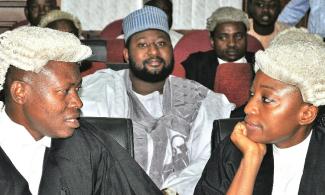
Shamsudeen was arraigned before Justice Nnamdi Dimgba of the Federal High Court sitting in Abuja, on February 1, 2017, on 20 counts bordering on money laundering.
Nigeria's anti-corruption agency Economic and Financial Crimes Commission has filed an appeal challenging the judgment that discharged and acquitted Shamsudeen, son of the Bauchi State Governor, Bala Mohammed of N1.1 billion fraud charges.
Shamsudeen was arraigned before Justice Nnamdi Dimgba of the Federal High Court sitting in Abuja, on February 1, 2017, on 20 counts bordering on money laundering.
However, in a ruling delivered on December 14, 2021, on a no-case submission, Justice Dimgba upheld Shamsudeen’s submission in part by dismissing 11 out of the 20 charges.
He was left to defend himself for his failure to declare some of his bank accounts and the amount in them to the EFCC, identity fraud, and forgery.
But delivering judgment in a suit numbered FHC/BAJ/CR/252/2016 on February 7, 2023, Justice Dimgba held that the EFCC failed to prove the allegations beyond a reasonable doubt.
On the allegations that the defendant forged signatures and documents to access illegal funds, the judge said the anti-graft agency’s forensic expert did not provide sufficient evidence to prove the charge.
“The law is settled that in a charge of forgery, it is essential to prove that the accused person forged the document in question.
“An allegation that a document is forged is a criminal allegation that must be proved beyond reasonable doubt and not by speculation,” he said.
The judge held that the burden of proof rests on the prosecution, adding that it did not discharge the burden beyond a reasonable doubt.
“The question, therefore, is on a holistic consideration of the evidence led by the prosecution, can it be said that there is evidence sufficient to lead the court to the conclusion that the defendant is guilty of the offence contained in the surviving counts 11 to 19?
“Looking at the case being made out as a whole in the light of the entirety of the evidence adduced on both sides, it appears to me that there are very reasonable doubts thrown up in the case.
“This will make it very difficult for any reasonable tribunal to proceed to find the defendant guilty of the charge in counts 11 to 19 on the strength of the evidence available.
“In the final analysis, having reviewed all that has been provided, I am not convinced that the prosecution has discharged the burden placed on them by law to prove the guilt of the defendant beyond reasonable doubt on any of the remaining 9 counts of the charge,” said the judge.
The judge also ordered the prosecution to refund Mohammed’s son’s N580,000 and $60,000 as well as other items taken from his apartment in the course of executing the search warrant on his apartment.
The EFCC had alleged that Shamsudeen made payments of huge sums in cash for the purchase of properties in different parts of Abuja without going through a financial institution.
Not satisfied with the judgement, the anti-graft agency through its counsel, Wahab Shittu, SAN, has filed a notice of appeal before an Abuja Division of the Court of Appeal, praying the court to set aside the judgement.
The EFCC in 13 grounds of the Appeal, sought only one relief: "an order allowing the appeal, setting aside the judgment of the Honourable Nnamdi Dimgba of the Federal High Court, Abuja dated 7th day of February and in its place entering an order convicting and sentencing the Respondent".
In the notice of appeal obtained by SaharaReporters on Friday, the anti-graft agency kicked against the decision which discharged and acquitted the Respondent on counts 11, 12, 13, 14, 15, 16, 17, 18, and 19 before Justice Dimgha of the Abuja Division of the Federal High Court.
In one of the grounds of the appeal, EFCC stated, "The trial court erred in law by holding that the case of the Appellant against the Respondent on Count 11 of the Charge was not proved beyond reasonable doubt.
"The trial court ignored legally admissible evidential materials of proof beyond reasonable doubt, which itself had reflected on page 12 of the judgment tendered by the Appellant in support of counts 11-15 as follows."